

EMPOWERING TRANSFORMATION
The development of science and technology capabilities plays a key role in uplifting industry standards and advancing Singapore’s City in Nature vision.
Tackling challenges
with science and tech
NParks’ Science & Technology (S&T) Masterplan guides overall organisational efforts in harnessing science and technology to advance our City in Nature vision. These efforts are strategically directed and overseen through distinct workstreams that represent key S&T domains integral to NParks’ mission, including arboriculture, botany, conservation biology & planning, and animal health & management.
In tandem, NParks’ Digitalisation Masterplan provides a roadmap for the use of technology to strengthen professionalism and to address existing and emerging challenges such as a declining labour force, rising public expectations, and the increasing scope and complexity of its work. The masterplan emphasises an ecosystem approach to developing operational technology capabilities in core areas of NParks’ work such as tree and park management, conservation and biodiversity management, and park planning and development.
Multiple research, operations technology and digitalisation projects have been rolled out in the reporting year or are currently ongoing. These includes a new greenery management model for the Bishan-Ang Mo Kio district, which will leverage a suite of technological tools to transform NParks’ greenery management processes, enhance work productivity and elevate the capabilities of staff and the wider landscape industry.
In line with NParks’ focus on science and technology, a new Branch was set up in 2022 to enhance oversight of organisational science and technology planning, and to synergise and support efforts. Other initiatives such as a quarterly Research Colloquium and regular newsletters were introduced to keep staff updated on the latest scientific studies that NParks is involved in.
MAPPING DATA WITH MAVEN II
As part of NParks’ digitalisation roadmap to transform processes and enhance productivity, NParks developed Maven II, a centralised, intuitive geospatial platform for NParks operations such as greenery management. The map-based work platform interfaces information from various digital tools and integrates information from sensors such as bin and ammonia sensors, into a centralised dashboard.
A Contractors’ Portal allows contractors to receive works order information and update photographic evidence of work done on-the-go. Officers may also carry out remote certification of work done based on data received from sensors. The system also has a self-billing function, resulting in an automated seamless end-to-end process for NParks and its contractors.
These digital tools, including the Contractor Fleet Management System and Grass Height Sensor, were piloted in the Bishan-Ang Mo Kio district together with landscape contractors as part of the Landscape Sector Transformation Plan to upskill the landscape sector.
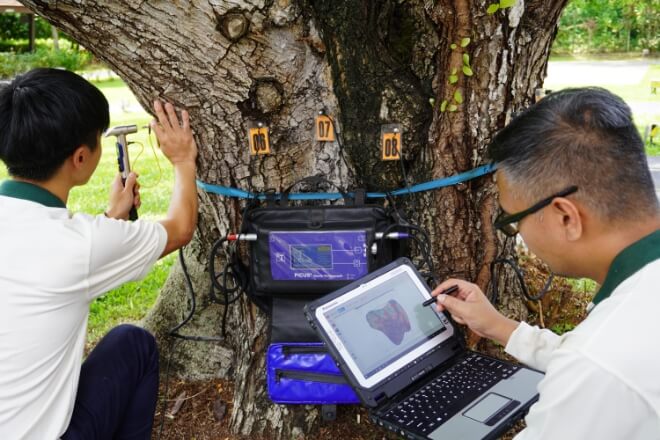
The launch of Maven 2 will enhance our operations including greenery management and park facilities management.
Advancing
our research
NParks currently leads the City in Nature research vertical of the Ministry of National Development’s Cities of Tomorrow Research and Development Programme, funded under the Research, Innovation and Enterprise (RIE) 2025 Plan. This research vertical seeks to deepen the scientific foundation for our City in Nature vision, by leveraging scientific expertise, technical capabilities and practitioner experience from various local research institutes, agencies, and companies to enhance ecological and climate resilience and inform nature-based solutions. The first grant call has been launched for research topics in urban greenery, nature-based solutions for inland climate change adaptation and managing human-nature relationships.
Under the RIE2025-funded Marine Climate Change Science programme, NParks has also started to award its first research projects. These upcoming studies aim to advance the scientific understanding of Singapore’s blue carbon habitats and dynamics, by undertaking national blue carbon accounting, mapping and predictive modelling, and to also strengthen the ecological resilience of Singapore’s urban coral reefs by examining the viability of potential ecological and microbial solutions.
NParks’ Long-Term Socio-Ecological Research programme brings together a suite of ongoing and upcoming projects and research activities that will collectively enable NParks to monitor the long-term socio-ecological impacts of our City in Nature strategies. Efforts under the programme will leverage dedicated long-term study sites, repeated studies and integrated and interdisciplinary efforts, in order to generate new scientific insights to advance our City in Nature.
One of the programme's latest research projects seeks to better understand the values, beliefs, and norms of Singaporeans towards nature, and how City in Nature efforts can influence their physical, mental and social well-being.
MANAGING TREES REMOTELY
NParks has implemented a Remote Tree Management System which uses machine learning models to automatically extract the geospatial location and physical parameters of trees, such as their height and girth from Light Detection and Ranging (LiDAR) point cloud data.
The extracted tree parameters also update the Tree Structural Model which predicts the structural condition of trees under different wind load conditions. The digital twin, including the panoramic images collected, enable arborists to inspect the tree visually and undertake virtual inspection.
Understanding
tropical forest
ecology
In the past year, significant progress was made in ecology research at the Central Catchment Nature Reserve with the establishment of the Long-Term Forest Ecological Monitoring (LTFEM) plot network. This involved restoring and resurveying 62 historical plots which were originally surveyed in 1992 by Mr Wong Yew Kwan, Singapore’s first Commissioner of Parks and Recreation. Bird surveys and full deployment of camera traps were also carried out across these plots to track the movement of wildlife.
A subset of the LTFEM plots was further surveyed for aboveground biomass assessment of forests at the nature reserve. The findings of this research project emphasised the importance of conserving mature trees for their ability to sequester carbon effectively.
Resurveys of seedlings and saplings were also conducted at 40 previously established plots at the Nee Soon catchment area.
All the studies enhanced our understanding of changes in Singapore’s forest ecosystems over the past three decades and contributed to our efforts in improving forest conservation and resilience.
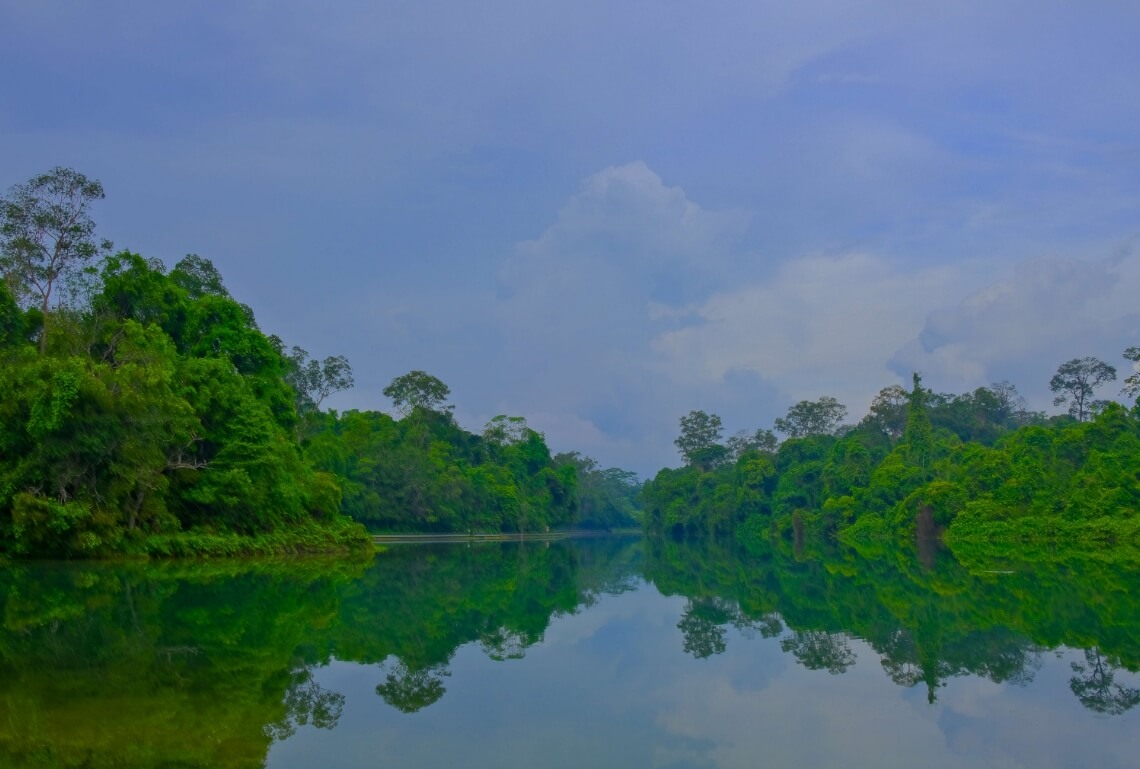
The Central Catchment Nature Reserve occupies over 2,000 hectares of forest cover and is home to some of the richest forests in terms of biodiversity, which includes the endemic Swamp Forest Crab (Parathelphusa reticulata) and Critically Endangered Raffles Banded Langur (Presbytis femoralis).
USING TECH IN BIODIVERSITY SURVEYS
In recognition of its efforts in biodiversity conservation, Singapore was chosen to host the semi-finals of the international XPRIZE Rainforest competition which took place at the Central Catchment Nature Reserve. The competition, organised by the XPrize Foundation, showcased how technologies such as autonomous vehicles and drones could be used to help conduct comprehensive biodiversity surveys in remote forest areas. The findings from the competition will be analysed for new discoveries.
Predicting plant
responses to
climate change
Another breakthrough study confirmed the evolutionary relationships and speciation patterns of Syzygium, the world's largest tree genus. Syzygium features the greatest diversity of species in Singapore as well as other Southeast Asian forests. The two-year study, led by the Singapore Botanic Gardens in collaboration with 26 research institutions, provided valuable insights into plant species evolution amid environmental changes.
The ability to predict plant responses to climate change will guide conservation and management efforts for plant communities. The findings from the study were published in the Nature Communication, a leading scientific journal, in September 2022.
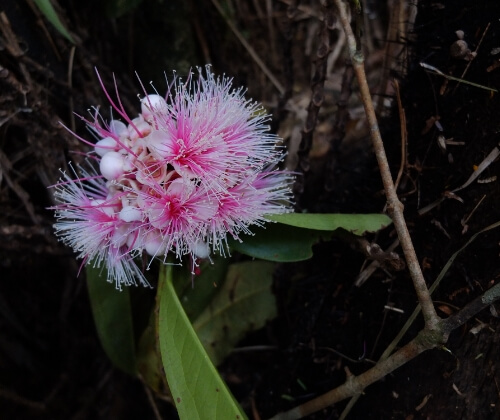
A flowering branch of the Sea Apple (Syzygium grande), one of the pioneering tree species planted along the roadside when Singapore’s nationwide greening campaign was initiated in 1963.
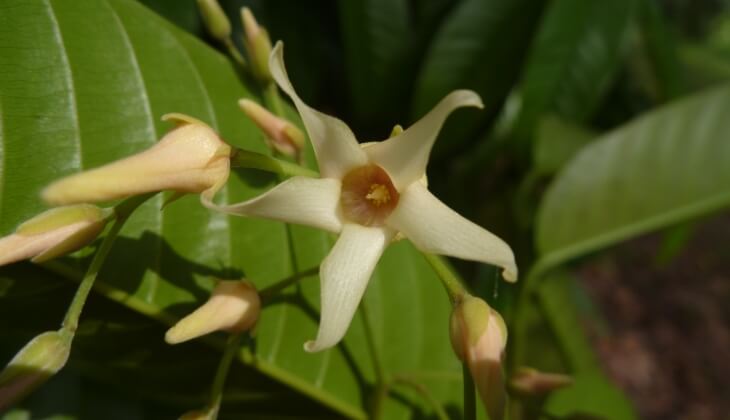
The native, Critically Engangered Shorea bracteolata is one of the 3,000 species featured in the Flora of Singapore catalogue that describes the diversity of all families, genera and species of bryophytes, lycophytes, ferns, gymnosperms and angiosperms that are native, naturalised or casual in Singapore.
UNCOVERING THE EVOLUTIONARY HISTORY OF PLANTS
As part of the Flora of Singapore project, baseline genomic data for some 1,300 species of native plants was generated. This sheds light on the evolutionary history of plants, enabling researchers to gain a better understanding of species relationships, genetic diversity, ancient population dynamics and even predict the impact of ecological changes on plant survival for effective intervention in plant conservation.
Launching the
definitive guide
to plants in
Singapore
A definitive reference guide to the native, naturalised and casual plants in Singapore was launched on 21 May 2022. Extensive research was put into producing the “Flora of Singapore: Checklist and Bibliography” which includes records of over 3,000 species from the region.
The guide accounts for all the names ever used for wild plants here, as well as their bibliographic references and conservation assessments. This was clarified from over 7,500 names used in almost 50,000 literature citations from plant research in Singapore over the last 200 years. The publishing of this guide affirms the Singapore Botanic Gardens' global position as a leading tropical botanical institute.
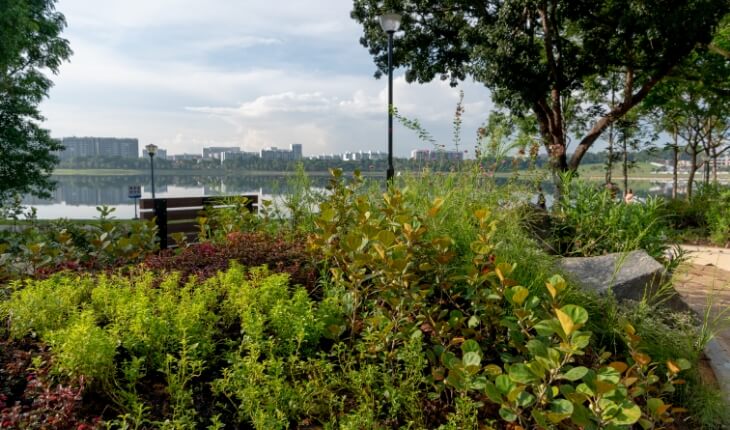
One of the "Design Guidelines for Contemplative Landscapes" includes incorporating views of a body of water to encourage calmness and bring a sense of freshness and energy to the space. The site of the Therapeutic Garden at Bedok Reservoir Park was thus chosen for its scenic views of the reservoir.
Making the
connection
between health
and nature
To substantiate the health and well-being benefits of people-nature interactions, NParks conducted five research studies to explore the relationship between time spent in nature and people’s well-being. The findings from these studies were published in several scientific papers.
NParks’ Centre for Urban Greenery and Ecology (CUGE) has also published "Design Guidelines for Contemplative Landscapes" to facilitate the implementation of landscapes that enhance mental well-being. The guidelines are based on a study into the effects of landscapes on brain activity.
Uplifting the
landscape
industry
The adoption of a science-based approach, backed by research and the effective use of technology, enables NParks to push industry standards to a higher level.
For example, the Landscape Excellence Assessment Framework (LEAF), which recognises organisations’ efforts to restore nature into the built environment, is backed by studies which show how greenery can mitigate urban heat island effect and have a therapeutic effect on people.
In 2022, 10 projects were recognised for outstanding greenery under LEAF. They included six parks and gardens as well as four developments. Two projects – the Gallop Extension at Singapore Botanic Gardens and Thomson Nature Park – received the platinum certification, which is the highest level under LEAF. In all, 90 projects have been certified since the framework was launched in 2013.
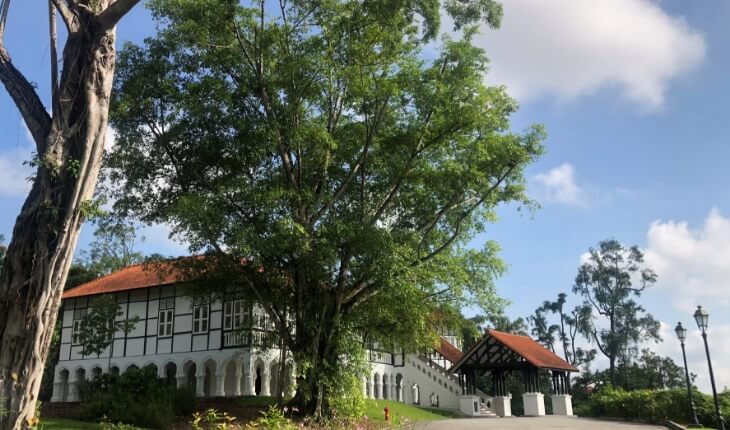
Awarded the platinum certification under the Landscape Excellence Assessment Framework, the Gallop Extension is distinguished by the sensitive restoration and conservation of the site’s natural and cultural heritage.
Promoting
skyrise greenery
NParks is stepping up efforts to work with building developers, industry players and building sector professionals to raise technical know-how and standards in skyrise greenery. This will help promote multi-functional skyrise greenery and their sustainable operations and maintenance.
Skyrise greenery technical guides will be updated and translated into micro-learning courses to raise landscape and building sector professional competencies, and a skyrise greenery technical tour has been introduced at HortPark to impart sustainable greening practices.
NParks’ Centre for Urban Greenery and Ecology (CUGE) has also launched a skyrise greenery certification course while its research arm embarked on a study into the energy efficiency and thermal benefits of co-locating green roofs and solar panels. .
In 2022, NParks released the third edition of its Skyrise Greenery Showcase e-booklet which highlighted exemplary skyrise greenery projects across building typologies in Singapore. A total of 15 projects were featured including CapitaSpring, Parkroyal Collection Marina Bay, Eunos Polyclinic, Pathlight School and Ang Mo Kio Court.
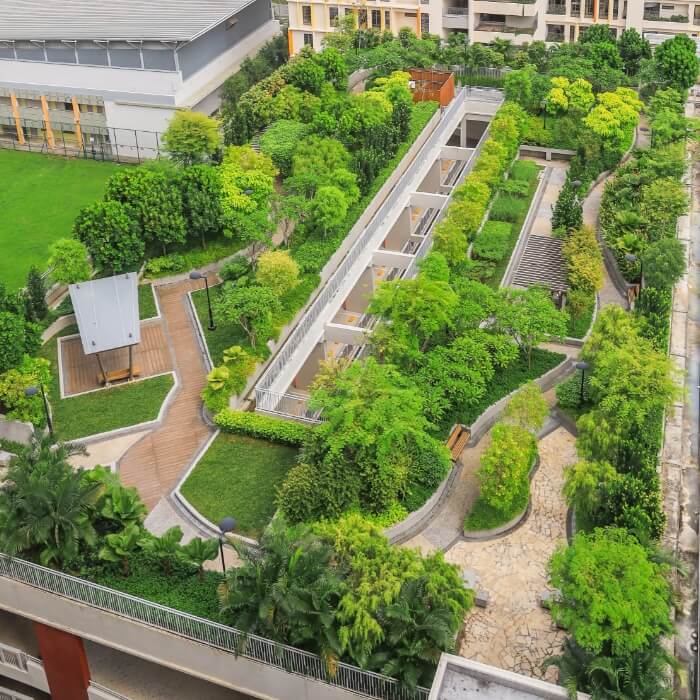
The rooftop carpark of Ang Mo Kio Court has been transformed into a lush garden complete with over 37,000 shrubs and trees for residents to enjoy a spot of greenery and recreation.
Raising
standards in
environmental
impact
assessment
To improve the quality and rigour of environmental impact assessment (EIA) work in Singapore, the engagement of EIA consultants will be carried out under a centralised NParks tender instead of standalone contracts by individual agencies. This not only minimises duplication of time and effort in the tender process but also enables NParks to work more closely with the consultants to standardise survey methodologies and develop best practice guidelines for the industry.
AVS launches
accreditation
for dog trainer
certification
A Certified Dog Trainer Scheme accredited by NParks’ Animal & Veterinary Service (AVS) was launched as part of efforts to raise the standards and professionalism in the dog training industry. It serves as a competency benchmark for dog trainers and signals a clear shift towards safe and effective training methods that are grounded in science, ensuring that the welfare of dogs is safeguarded during the training.
Accredited trainers will be required to comply with codes of conduct set by their certifying bodies. Launched in December 2022, the new certification scheme replaces the Panel for the Accreditation of Dog Trainers scheme.
Licensing of dog
breeders and
pet boarders
Revised licensing conditions for dog breeding and pet boarding took effect from 1 April 2022 with the aim of improving the health and welfare of animals. Amongst the new conditions is the prohibition of in-breeding and the breeding of dogs with known harmful heritable conditions. They also stipulate the maximum age for breeding dogs and the maximum frequency for breeding to protect the dogs' welfare.
Engaging
stakeholders in
the veterinary
sector
AVS has been engaging stakeholders to raise professional standards in the veterinary sector. Following a survey of the veterinary profession in 2021, AVS conducted focus group discussions with members of the industry and users of veterinary services to identify areas to work on, including upholding professional standards for the veterinary sector and the importance of promoting lifelong education in the profession. In conjunction with World Veterinary Day on 30 April 2022, the book “Vets at Work” was launched and highlights the history of the Singapore Veterinary Association and the significant contributions that Singapore’s veterinary professionals have made to society over the years.

The veterinary community plays a critical role in safeguarding both public health and animal health. Vets help with the early detection of viruses in our companion animals, safeguard Singapore against zioonotic diseases as well as educate pet owners on responsible pet ownership.
Sharing our
expertise
NParks is actively involved in the sharing of expertise on the global stage, on topics ranging from biodiversity to climate change and wildlife management.
NParks participated in the fifteenth meeting of the Conference of the Parties to the Convention on Biological Diversity (COP15), held in Montreal, Canada in December 2022. At COP15, the parties present adopted the Kunming-Montreal Global Biodiversity Framework, which aims to catalyse and enable urgent transformative action by nations to halt and reverse biodiversity loss.
NParks was also invited to present at the City Summit Pavilion on the Singapore Index on Cities’ Biodiversity (SI), a self-assessment tool that helps cities measure and benchmark their biodiversity conservation efforts, that is critical for parties to fulfil the implementation of the Framework, in particular Target 12 on urban green and blue spaces enhanced for human well-being.
NParks also hosted a series of international webinars in collaboration with partners and experts. Held between July and September 2022, the webinars were aimed at raising awareness and understanding of wildlife to allow communities to safely share spaces and enjoy the benefits of living close to nature. Speakers included several international subject matter experts from distinguished educational institutions and agencies.
Upskilling the
industry
In June 2022, CUGE launched a new Training Management System to streamline and enhance training administration processes for its courses, workshops and certification programmes. To date, NParks has offered about 2,300 training and assessment places for Workforce Skills Qualifications (WSQ) courses and close to 2,750 for non-WSQ courses. New CUGE courses introduced in 2022 include those on developing nature play programming as well as advanced tree decay assessment. These training modules play a crucial role in ensuring high quality work by the industry as they support our City in Nature vision.
NParks also continued to collaborate with institutes of higher learning, supporting the Student-Run Park programme with the Institute of Technical Education (ITE) and Ngee Ann Polytechnic, as well as internships, immersion programmes and learning journeys. These covered topics such as the use of digital tools, playground safety inspection, nursery practices and biodiversity management.
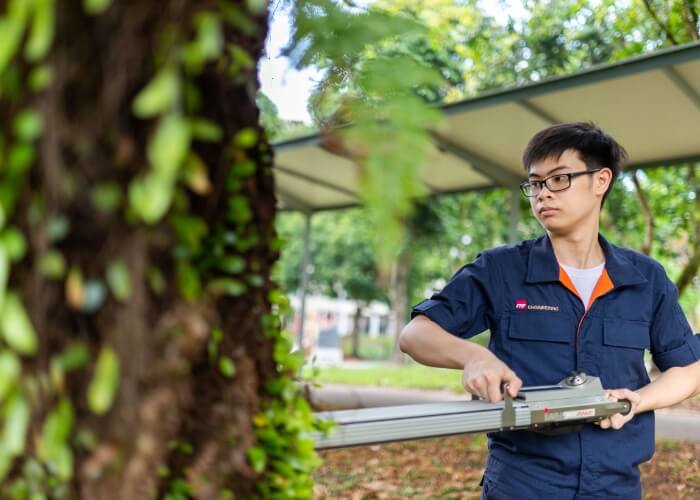
Through the NParks-ITE collaboration on curriculum enhancements, students can build up their capabilities in arboriculture tools such as the Tree Structural Model, sonic tomography, resistance drilling, laser rangefinders, drones and greenery management tools commonly used in the landscape industry,
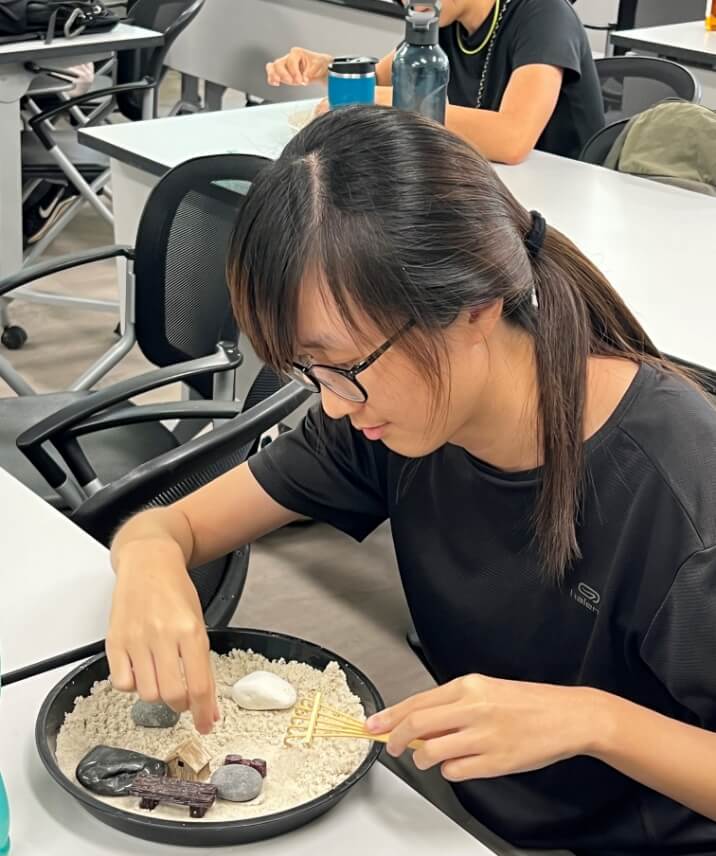
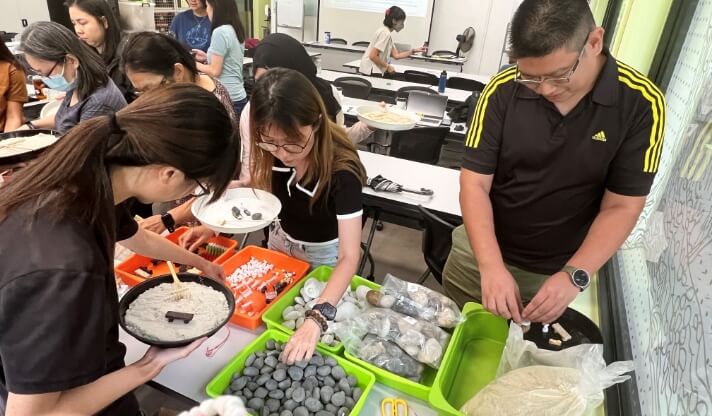
Participants in one of CUGE’s courses learnt about developing therapeutic horticultural experiences through a hands-on workshop.
Providing
guidance in staff
training and
development
NParks has refreshed the competency framework that guides its officers in the training and development programmes that they may wish to undertake.
Collaborative learning continued to be an important aspect of staff development at NParks. Under the Hort Champs programme which facilitates the exchange of knowledge amongst staff, 12 workshops were conducted in 2022. They covered topics such as plant identification, new or uncommon plants for landscaping as well as pest and disease management. The workshops attracted about 100 participants on average, helping staff to keep their skills updated and relevant.
The quarterly Hort Colloquium also serves as a platform for staff and industry experts to share and exchange horticultural know-how. The 46th to 49th editions saw an average of 220 participants attending talks on topics such as waterlily care by Mr Danny Cox from Longwood Gardens in the United States, and Tropical Freshwater Swamp Forests by Dr Chong Kwek Yen from the Singapore Botanic Gardens.
NPARKS RECOGNISED FOR DIGITALISATION STRATEGY
NParks was presented with the International Data Corporation (IDC) Future Enterprise Award (Future of Work) for its digitalisation strategy that involves the use of a science-based approach to develop digital tools and analytics to enhance efficiency in park and horticulture management, and to strengthen the conservation and management of nature and biodiversity. An example is the automatic extraction of tree measurements to build accurate digital twins that help enhance field operations and improve tree risk management.
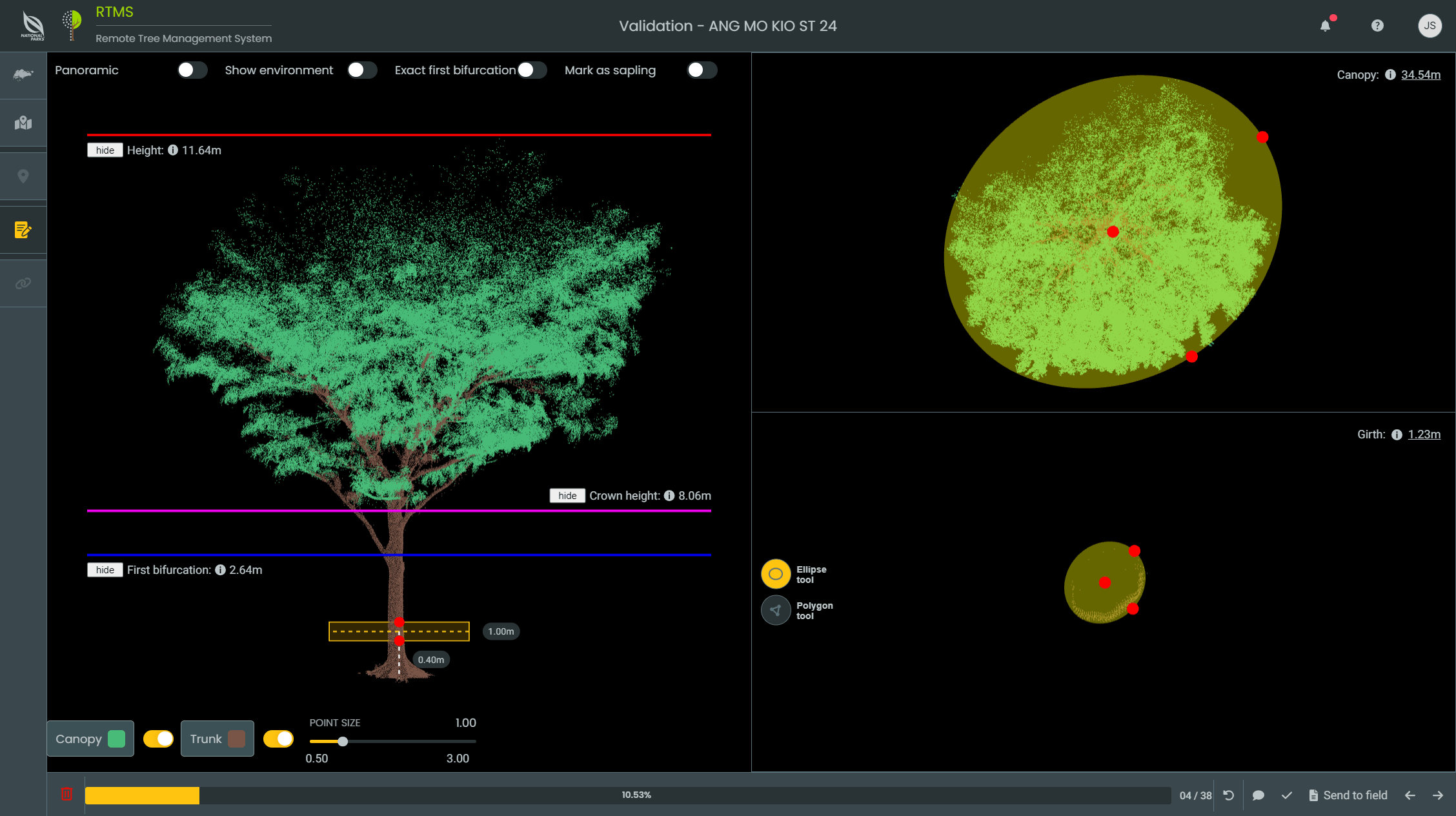
The Remote Tree Management System uses artificial intelligence to extract dimensions from the digital twins of trees, allowing for automatic tree inventory updates with LiDAR technology. NParks is also able to run some of our applications remotely, such as the Tree Structural Model, aiding work in managing our trees.
Creating a
family-friendly
work culture
NParks received a commendation for the Great Companies for Dads Awards 2023, in support of the Made For Families initiative. To support staff in taking care of their families and strengthening family ties, it put in place family-friendly initiatives such as flexible work arrangements, “Back to School with Mom and Dad” to give staff with school-going children time-off during the first week of school, and “Eat With Your Family Day” to allow staff to leave work earlier to join their families for dinner.
Staff were also given “NParks Family Day” tickets to bring their families to recreational attractions such as Universal Studios and Night Safari, and a “Bring Your Family to Work Day” was organised for staff to bring their children to the workplace for fun-filled activities and to show their children what they do at work.